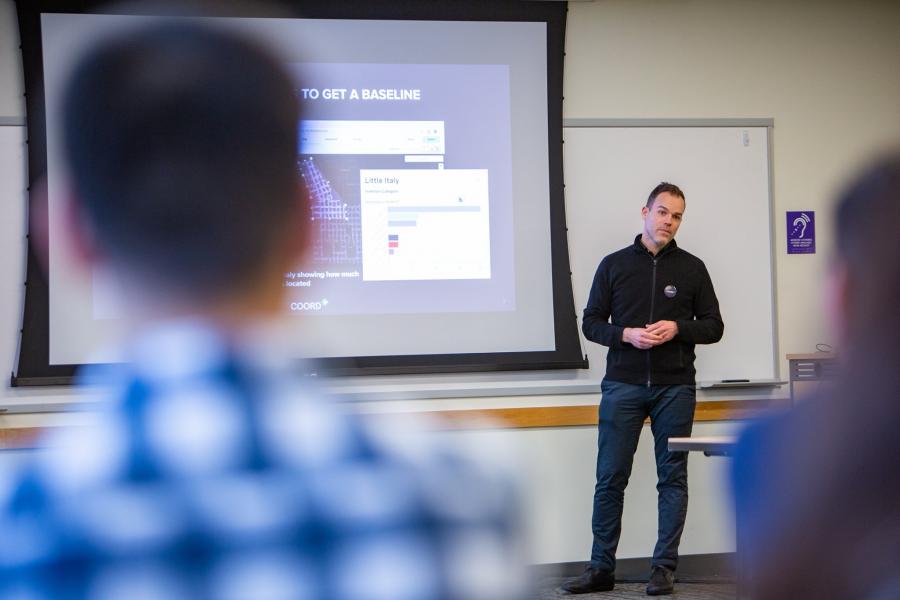
DECEMBER 10, 2019 — The Urban Freight Lab hosted its third annual Tech Day: Transforming the Final 50 Feet of Delivery event on December 10, 2019 at the UW Seattle campus, during the Autumn Quarter membership meeting. Tech Day serves as a model for UFL members and public sector partners to evaluate new technologies in real time to determine their efficacy to meet business needs and city goals, and for contestants to gain exposure and receive feedback on their products. In addition, a panel of venture capitalists was in attendance to provide an investor’s perspective and gain knowledge about new ideas in this space.
In Spring 2019, the Lab issued a Call for Proposals, inviting early- and mid-stage business to submit novel and innovative solutions to the following key problems:
- Reducing parking seeking behavior in dense urban areas;
- Improving commercial vehicle parking space productivity;
- Reducing the rate of failed first deliveries; and
- Reducing dwell time for delivery vehicles.
Each proposal was to contain: a description of the solution, an explanation of how it works, an explanation of how it addresses the key problems, a justification for how the product/concept is technically feasible within two years, and an outline of costs and scalability.
We received 18 submissions (an increase from 7 in 2017; 9 in 2018) and our review team selected the following five finalists based on technical feasibility, business application, and market potential to present their solutions at Tech Day:
- Coord: A dynamic curb management system with changing conditions in real time based on need, improving vehicle parking space productivity and reduce parking-seeking behaviors in dense urban areas.
- Populus: A dynamic curb loading zone and pricing pilot that builds communication flows between fleet operators such as goods delivery and ride-hailing vehicles to improve efficiency curbuse.
- StoreX: A high-density storage and retrieval machine, reducing the rate of failed first deliveries and reducing dwell time through creating density.
- Sucasa: A delivery hub network of neighbors receiving packages on behalf of neighbors, reducing the rate of failed first delivery and reducing dwell time through creating density.
Each finalist was given 30 minutes to present including answering questions from the audience. This was followed by a 15-minute discussion by the audience (Lab members, partners, and investors).
Tech Day showed that a real-time evaluation of emerging delivery technologies by public officials, private sector firms, and potential investors helped all parties to understand whether new technologies would meet business needs, be scalable to other cities (providing sufficient market demand for investors), and public benefits for cities.
READ MORE
- Photos of Tech Day
- Tech Day Finalists Announced
- Urban Freight Lab Hosts Second Annual Tech Day 2018
- Innovative Technology Day @ the Urban Freight Lab
In the Media:
Freight Waves: Urban Freight Lab announces final 50 feet competition
About the Urban Freight Lab (UFL): An innovative public-private partnership housed at the Supply Chain Transportation & Logistics Center at the University of Washington, the Urban Freight Lab is a structured workgroup that brings together private industry with City transportation officials to design and test solutions around urban freight management problems that overlay private and public spaces and control and have benefits for both.
About the Final 50 Feet Research Program: The Urban Freight Lab’s Final 50 Feet research program designs and tests solutions to improve delivery at the end of the supply chain—beginning at a load/unload parking space at the curb, in an alley, or in a private loading bay, and maneuvering through sidewalks, intersections, and building security, and ending with the final customer. This final segment of the supply chain is the most difficult and expensive (estimated at 25-50% of total supply chain transportation costs).